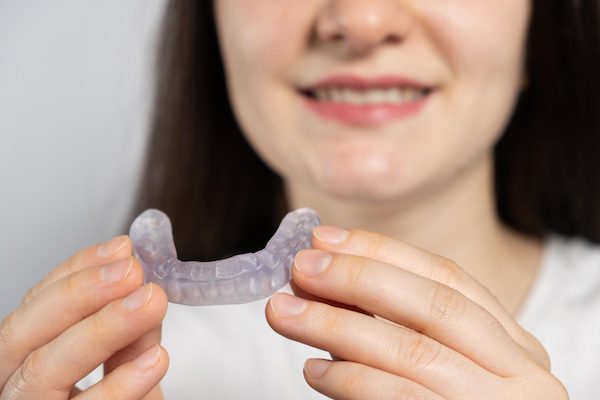Occlusal Splints
Occlusal Splints Applecross
Occlusal splints are recommended for people who grind or clench their teeth: a condition called “bruxism” and for people that have had dental treatment due to bruxism.
Bruxism is excessive teeth clenching, grinding or chewing. It can lead to excessive tooth wear, which might cause:
- permanent enamel and tooth structure loss
- cracking and splitting of teeth
- damage to jaw joints
Bruxism can occur in adults and children during the day or at night.
Causes of Bruxism
Some physical and/or psychological factors that might contribute to bruxism include:
- stress, anxiety and tension
- sleep disorders
- abnormal bite or jaw alignment
- illness, nutritional deficiencies or dehydration
Signs and Symptoms of Bruxism

The signs and symptoms vary with the intensity, frequency and nature of the clenching and/or grinding and might include:
- chronic facial pain with tension head and neck aches
- partners or family can ‘hear’ a grinder
- pain when biting
- cracks, chips and fractures in teeth
- clicking and pain in jaw joints that feels like an earache
- teeth are worn flat – often to the dentine
Occlusal Splints in Applecross
Occlusal splints are often customised to suit the specific needs of a patient.
For more information on occlusal splints, consult with your Applecross dentist today. Call us on (08) 9316 0555.
We are located at 729 Canning Hwy in Applecross WA.
Frequently Asked Questions
What is an occlusal splint?
An occlusal splint is an acrylic guard fitted to the upper jaw and covering the biting surfaces of your upper teeth that can help ease grinding symptoms and protect your teeth and jaw from further damage.
What is bruxism?
Some people grind their teeth and/or clench their jaws while sleeping. This is called bruxism and is an involuntary habit.
Do I have to wear my occlusal splint every night?
Your dentist let you know how often and for how long you need to wear your occlusal splint. This is because it will depend on your history, symptoms and why the splint has been recommended for you.
How do I care for my occlusal splint?
Looking after your occlusal splint is important for getting the most out of it and ensuring it lasts for as long as possible!
- Always clean your splint with cold water
- Make sure that you clean it before and after wearing it
- Store it in its container when not in use and somewhere safe.
